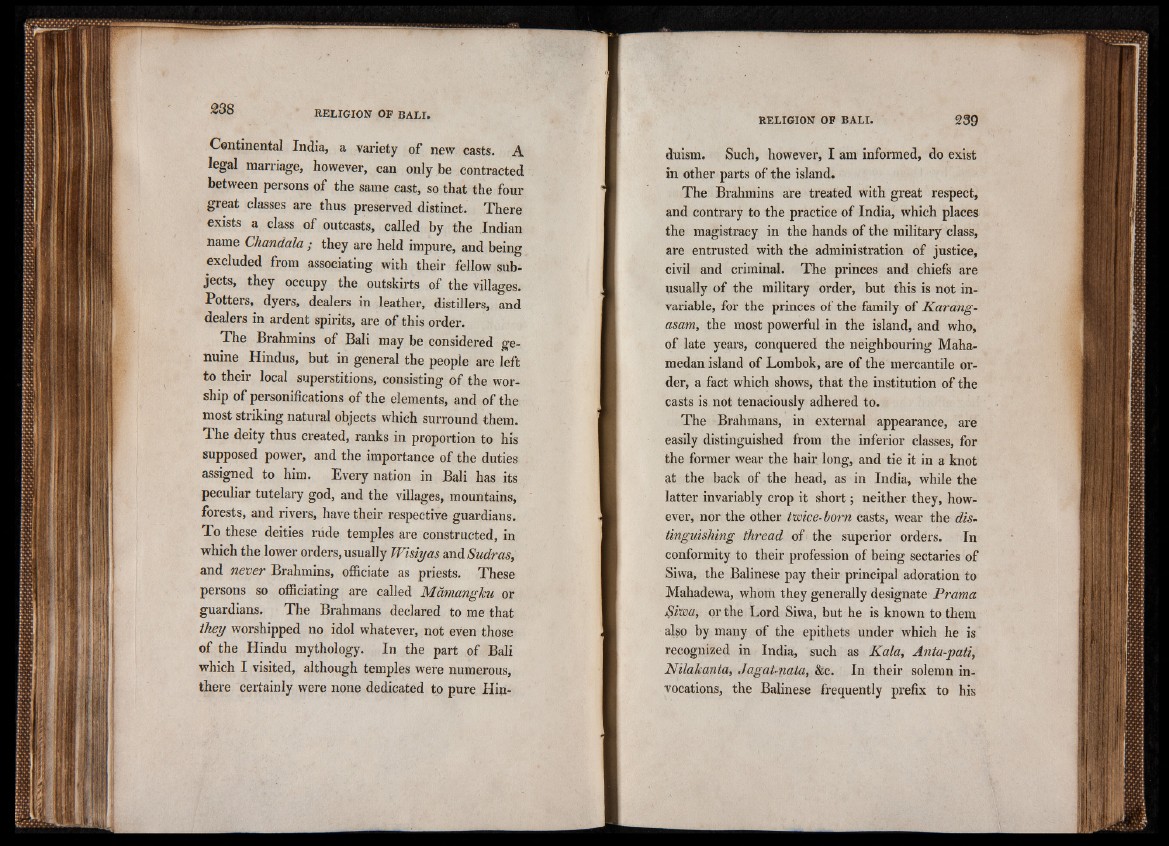
Continental India, a variety of new casts. A
legal marriage, however, can only be contracted
between persons of the same cast, so that the four
great classes are thus preserved distinct. There
exists a class of outcasts, called by the Indian
name Chandala ; they are held impure, and being
excluded from associating with their fellow subjects,
they occupy the outskirts of the villages.
Potters, dyers, dealers in leather, distillers, and
dealers in ardent spirits, are of this order.
The Brahmins of Bali may be considered genuine
Hindus, but in general the people are left
to their local superstitions, consisting of the worship
of personifications of the elements, and of the
most striking natural objects which surround them.
The deity thus created, ranks in proportion to his
supposed power, and the importance of the duties
assigned to him. Every nation in Bali has its
peculiar tutelary god, and the villages, mountains,
forests, and rivers, have their respective guardians.
To these deities rude temples are constructed, in
which the lower orders, usually Wisiyas and Sudras,
and never Brahmins, officiate as priests. These
persons so officiating are called Mamanghu or
guardians. The Brahmans declared to me that
they worshipped no idol whatever, not even those
of the Hindu mythology. In the part of Bali
which I visited, although temples were numerous,
there certainly were none dedicated to pure Hinduism.
Such, however, I am informed, do exist
in other parts of the island.
The Brahmins are treated with great respect,
and contrary to the practice of India, which places
the magistracy in the hands of the military class,
are entrusted with the administration of justice,
civil and criminal. The princes and chiefs are
usually of the military order, but this is not invariable,
for the princes of the family of Karang-
cisam, the most powerful in the island, and who,
of late years, conquered the neighbouring Maha-
medan island of Lombok, are of the mercantile order,
a fact which shows, that the institution of the
casts is not tenaciously adhered to.
The Brahmans, in external appearance, are
easily distinguished from the inferior classes, for
the former wear the hair long, and tie it in a knot
at the back of the head, as in India, while the
latter invariably crop it short; neither they, however,
nor the other twice-born casts, wear the distinguishing
thread of the superior orders. In
conformity to their profession of being sectaries of
Siwa, the Balinese pay their principal adoration to
Mahadewa, whom they generally designate Prama
jSiwa, or the Lord Siwa, but he is known to them
also by many of the epithets under which he is
recognized in India, such as Kala, Anta-pati,
Nilakanta, Jagat-nata, &c. In their solemn invocations,
the Balinese frequently prefix to his